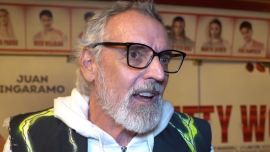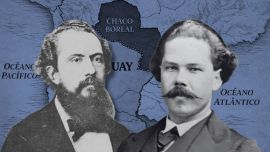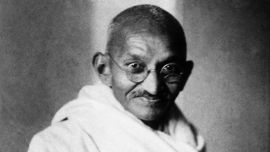Bolivian President Luis Arce vowed to prioritize fuel imports and debt payments as he navigates the dollar shortage that has taken the Andean nation to the brink of chaos.
In an interview in La Paz on Wednesday, the socialist leader described Bolivia’s economic woes as a temporary shortage of foreign currency which will ease as new investments come online to offset the slump in natural gas exports.
The nation of 12 million has been in crisis since the central bank almost ran out of foreign currency reserves last year, causing its currency peg to the dollar to effectively collapse. Amid shortages and accelerating inflation, Arce in June faced down a short-lived military rebellion in which a group of soldiers stormed the presidential palace.
“Bolivia’s problem is a temporary crisis of dollars. That is what we are short of,” said Arce, sitting beneath a giant portrait of 15 revolutionaries including Emiliano Zapata, Fidel Castro and Hugo Chávez.
New projects will help the economy turn the corner, including a state-owned steel mill set to start production this month, while rising agricultural production will cut reliance on imports, he said. Incentives for foreign oil and gas majors will boost drilling, while the national gas company will start producing at a recently-discovered “mega field” as early as 2026, he added.
Amid the dollar shortage, Arce is advising Bolivians sending money abroad to use crypto currencies rather than scarce greenbacks. He also accused opponents in congress of “sabotage” for blocking the approval of about US$1 billion in foreign loans which he says could have prevented the current situation.
If Arce fails to navigate the financial crisis it will further destabilise a region suffering political instability, social unrest and growing insecurity. Elsewhere in the Andes, drug gangs have plunged Ecuador into violent chaos, Peru is suffering soaring crime, while illegal armed groups capture more territory in Colombia.
'Complicated Situation'
Arce, 60, a UK-educated economist, said the slump in natural gas output is the root of the economy’s current difficulties. At the same time, domestic consumption of motor fuels and natural gas has surged and, in 2022, the country became a net importer of energy for the first time in decades.
“We are in a truly complicated situation because we are seeing the need to import larger and larger volumes, and at higher prices,” Arce said.
As a result, Bolivia’s foreign reserves shrank to US$1.9 in billion in August, down 90% from a decade earlier. And of that, just US$153 million was in cash and most of the rest in gold which cannot legally be sold.
Bolivia’s dollar bonds due 2028 currently yield 24 percent, a distressed level which indicates that traders see a high risk of default. Despite this, Arce said that bondholders have nothing to fear. He touted his own track record of consistently paying debt since he became finance minister in 2006.
“We’ve prioritised the payment of foreign debt,” Arce said. “We continue paying. There are no complaints.”
Political rivalry
Arce’s difficulties have been aggravated by his split with his former mentor, ex-President Evo Morales, who become Bolivia’s first indigenous president in 2006. That’s also caused the ruling socialist party to fracture, depriving the government of its majority in Congress. Morales is now Arce’s main rival ahead of next year’s presidential vote, although it’s still unclear whether he’ll legally be able to run.
Arce shows little sign of wanting to depart from the state-led economic model Bolivia has pursued since Morales first won the presidency and nationalised the natural gas industry. The state is taking the lead in the lithium, biofuels and steel industries in which he wants the economy to diversify.
With a fiscal deficit the government forecasts will be nearly eight percent of gross domestic product this year, it cannot easily afford diesel subsidies, which cost about US$1.7 billion last year. Yet eliminating them is politically difficult, especially in the year before an election. Arce said biofuels can help fix the problem.
The government brought its first soybean-fed biodiesel plant online this year and another will start operating in December. In 2026, it will start operations at a larger facility that can turn cooking oil and a variety of feedstocks into motor fuel.
Arce said these three plants can replace 60 percent of diesel imports in 2026.
In the meantime, Arce said he will turn to allies to seek favourable terms for diesel imports. He mentioned Russia as a strategic partner of Bolivia that is also a major oil power.
“But it isn’t just Russia. We are knocking on the doors of various friendly countries so we can have the sufficient amounts of diesel and gasoline,” he said.
He attributed shortages at filling stations in recent months to rough seas on the Pacific coast that made it difficult to unload tankers at Chilean ports, and said supplies will return to normal.
Oil and gas rebound
Arce says the oil and gas sector is about to rebound due to investments by state-owned YPFB.
The 1.7 trillion cubic feet of gas discovered at the Mayaya field is isolated from the nation’s pipeline network. But Arce said YPFB could cut costs by shipping the fuel directly to Brazil, a historic consumer of Bolivian gas that is hunting for more supplies.
Bolivia’s natural gas production will soon head into a new period of growth, he said. The country has one of the highest government takes, the combination of taxes and royalties, of any oil and gas producer. As a result, foreign companies have been reluctant to invest.
Arce said he is trying to change this by encouraging secondary recovery, or techniques to extract additional oil and gas from older fields where output has gone into decline.
“We started, some time ago, to meet with oil companies to propose a program of incentives,” he said. “So they can extract everything that is there.”
Lithium, steel
Lithium is another focus. While Bolivia has the world’s biggest resources of the battery metal, they have yet to be exploited in significant quantities due to problems with purity, poor infrastructure, and a history of political and social unrest.
Arce is betting on a new technique that involves extracting lithium directly from brine rather than letting it evaporate in giant ponds. The government is turning to Russian and Chinese companies in a bid to achieve large-scale commercial production at the new plants. Last week, the first contract was agreed with the Russian Uranium One Group. Other deals will be signed “very soon” with China’s CATL Brunp & CMOC, or CBC, and Citic Guoan, he said.
The government also plans to inaugurate this month a steel factory in Mutun, in the Santa Cruz department, using iron ore from what has been touted as one of the world’s biggest deposits. Bolivia hired China’s Sinosteel Equipment & Engineering Co. to build it for more than US$500 million.
“We are creating a broad based economy,” said Arce. “We don’t want to depend only on gas.”
related news
by Peter Millard & Sergio Mendoza, Bloomberg



















Comments